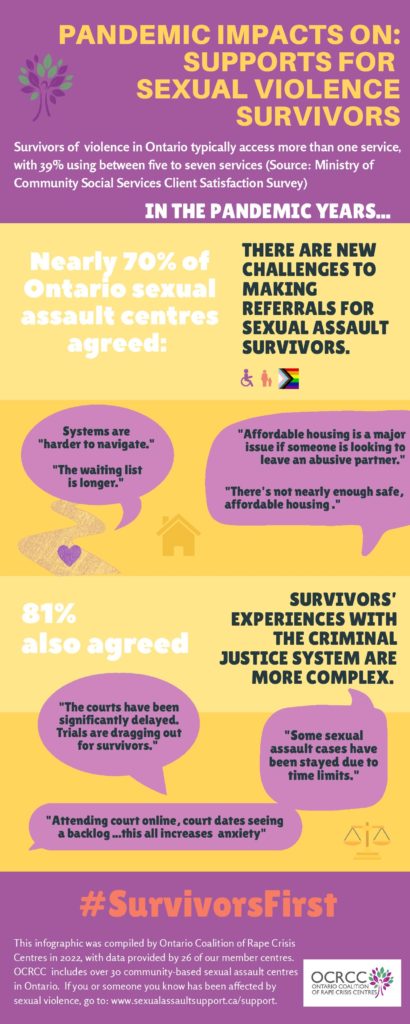May is Sexual Violence Prevention Month in Ontario.
Sexual assault centres have been operating in Ontario since the 1990’s. While the number of survivors accessing crisis supports and counselling has increased across the province—four-fold in some regions – funding has not. Centres have not received a funding increase from the provincial government since opening their doors.
Rape crisis centres have expanded their mandates to include programing like prevention education in schools, for community groups and organizations, and over social media. They’re dealing with increased costs due to inflation, higher rent, internet and cell phone services that weren’t needed in the ‘90’s, and the constant need for more full-time counsellors.
Recently, Statistics Canada released its findings of incident-based crime statistics in Canada. In Ontario, there were 7,434 police-reported sexual assaults in 2016. That number increased to 8,782 in 2017. For 2018, there were 10,634 reported incidents. That is a year-overyear increase of almost 19 per cent.
The Ministry of Community Social Services Client Satisfaction Survey found that survivors of gender-based violence in Ontario generally access more than one service. In fact, 39 per cent of survivors surveyed accessed 5 to 7 services.
Pandemic did not reduce sexual violence
The pandemic not only made it more challenging for survivors of sexual violence to navigate the systems in order to access the care they need. It also gave rise to the myth that sexual violence wasn’t prevalent or really an issue because people were staying home.
According to Nicole Pietsch, Writer and Advocate for Ontario Coalition of Rape Crisis Centres, sexual assault centres were reporting just as many assaults. The centres were also reporting new risks faced by clients.
“Domestic violence increases for anyone in abusive situations. Child sexual violence or intimate partner violence (IPV) victims don’t have the option to provide consent,” said Pietsch in an interview this week.
She went on to say, “Young people and women experiencing domestic violence faced sexual violence at home with less access to in-person resources or the ability to resist by leaving home.”
Increased human trafficking and sexual exploitation has been ongoing throughout the pandemic. Pietsch says this has been big business for traffickers who traffic women and marginalized people in sex work, the construction and restaurant industries, and agricultural production.
The pandemic really opened the door in terms of sexualized violence. There was an increase of trafficking through online ads and solicitation. Pietsch says while those criminal activities never stopped, there was less access to help especially for young folks who are more vulnerable to exploitation.
Pietsch says, “One awesome thing that the prior Liberal government did was care about sexual violence. And, at a good time.”
There were a number of high-profile sexual assault cases from 2016 to 2020. In Canada the verdict in Jian Ghomeshi’s trial reinvigorated the #BeenRapedNeverReported movement started in 2014 by journalist Antonia Zerbisias. The #MeToo movement, started in 2006 by Tarana Burke, also gained momentum when Rose McGowan accused Harvey Weinstein of rape. These cases and movements generated much needed talk about sexual violence.
Media also focused attention on the high number of sexual assault cases that are designated ‘unfounded’ by police. While the term ‘unfounded’ suggests that these sexual assaults never happened, it simply means there was not enough physical evidence to move the case forward.

Ontario’s Wynne government focused on sexual violence
Pietsch maintains that the Wynne government, in power from 2013 to 2018, really cared about violence and showed it by implementing substantive policy. Pietsch highlights the fact that a mere five years ago, the scene on college and university campuses was very different.
According to Pietsch, “It may seem like we’ve always had sexual violence prevention and response on campuses, but I think before 2017 almost no Canadian colleges or universities had a sexual violence policy. And, because of that the [Wynne] government really championed that. They listened to students living on campuses and how that was really problematic. Survivors who were victimized in a campus environment by a peer, or at a party, or by a teaching assistant often just left.”
Post-secondary campuses are now required to carry out more prevention and provide more responses. The Wynne Liberals really led that and because of that leadership, other provinces have implemented similar policies.
The Wynne government also had an action plan around sexual violence that would have increased funding to community-based sexual assault services by 30 per cent. The Ontario government is the core funder for sexual assault centres and that would have been the first increase since their inception.
That funding would have empowered each of the 30 sexual assault centres across Ontario to hire one additional full-time counsellor. Pietsch explained, “It was committed by the Liberal government and when they weren’t re-elected the Ford government didn’t honour it. So, we see that as a cut [to funding].”
Ford focuses on criminal justice system
Instead, the Progressive Conservative government has remained focused on criminal justice. Unfortunately, sexual assault survivors rarely have success using the criminal justice system. Many simply choose, or are encouraged by lawyers, friends and family, not to go there because their life will be put on trial rather that the actions of their alleged assailant. For others, the charge simply doesn’t proceed as in ‘unfounded’ cases.
“At the end of the day, it really is important that community organizations who work with victims of sexual violence see resources not just criminal justice organizations,” says Pietsch.
The same day the Ford government cut funding to sexual assault centres, it committed money to address human trafficking. Earmarking money for human trafficking is very different than providing funding to all survivors of sexual assault.
“If you look at the numbers it’s just big-time criminal response to preventing and responding to trafficking but very minimal around community-based organizations,” maintains Pietsch.
Ontario NDP seeks to reinstate 30 per cent funding increase
Sexual violence doesn’t seem to be on the radar of many of the parties, or their members, vying to lead the provincial government after June 2nd. The exception is the New Democratic Party (NDP) who has committed to re-instating the 30 per cent increase in funding directly to community-based sexual assault centres.
In addition, the NDP has promised to ensure that campus sexual violence policies are brought up-to-date.
Post-pandemic, Pietsch sees mental health as a priority especially for young people who have had a really tough time being isolated from supports. Reports of anxiety, depression, and eating disorders have really skyrocketed.
Survivors often don’t recognize that their anxiety, depression, or addiction is connected to a past experience of violence. Frontline workers in sexual assault centres understand that those are really common reactions to sexual violation and that survivors are facing ongoing mental health issues as the pandemic continues.
Pietsch observes that, “It’s very interesting to see that most parties, even our current government, often talk about new investment in mental health. But we think, as community-based sexual assault centres, why are we not included in that? Because if you put a dent in people having nowhere to go in the face of trauma, you will also mitigate mental health challenges as people move on in their lives.”
The OCRCC is holding a letter writing campaign to encourage the provincial government to re-instate the 30 per cent increase to funding promised in 2018. Templates for individuals and organizations who want to write to their MPP be found here.
The Ontario Coalition of Rape Crisis Centres includes community-based sexual assault centres that provide counselling, information and support to survivors of sexual violence in communities across Ontario.



